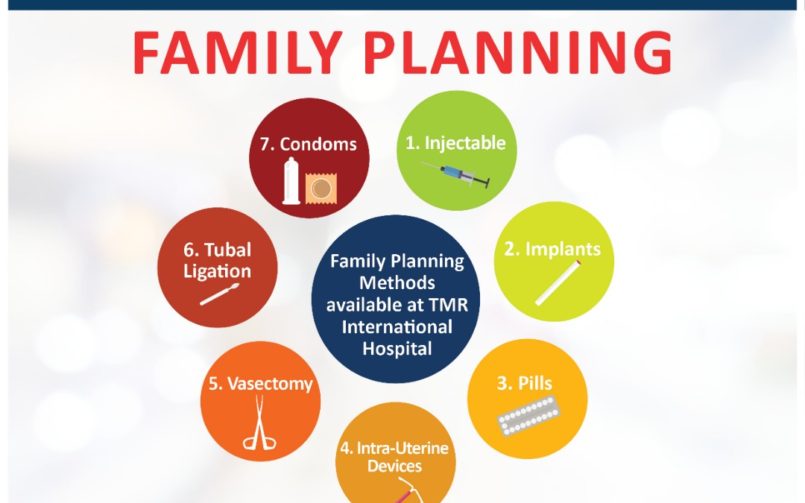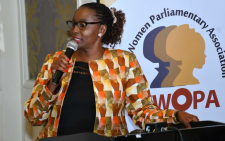Why we went the natural family planning way

Couples that resorted to natural ways of spacing their children tell of their experience and what made them make that choice.
Harriet James @harriet86jim
When Christopher Muindi and his wife, Glory Gakii Muindi, got their first child six years ago, they were elated.
Though in their mid-20s and young in the eyes of their folks, they wanted to have children and raise a family.
However, during the post-natal clinics, they were advised to start using contraceptives to prevent pregnancy and to determine the timings and number of children they wanted to have.
They gave in to the pressure and Glory had a copper intrauterine device (IUD) inserted. The side effects were disastrous.
“I was bleeding heavily and had continuous urinary tract infections (UTIs). My periods were painful and abnormal and I was irritable during intimacy. I remember we were regular visitors to a gynecologist here in town,” recalls Glory.
It was the side effects that made the two opt to remove the Copper IUD after six months of using it. In 2017, they learnt about the Natural Family Planning (NFP) after attending a five-days retreat at Vincentian Congregation for their spiritual growth and opted for it.
With the observation of the World Population Day yesterday, United Nations Population Fund indicates that fertility in women is at 2.4 and 3.3 children in the world and Kenya respectively.
The organisation shows that in the country, contraceptive prevalence rate women aged 15-49 is at 45 per cent for all women and 62 per cent for married women.
It also indicates that unmet need for family planning rate among all women aged 15-49 in the country is 12 per cent and 14 per cent for married women.
Unmet need
“Issues range from allergies, to dislodging like when the coil leads to excessive bleeding, weight gain, acne, spotting, irregular bleeding, spotting, heavy bleeding, reduced libido, headaches, breast pain among others,” explains Dr David Thuo consultant obstetrician, gynecologist and fertility specialist.
By definition, NFP or fertility awareness is a type of contraception where a woman both monitors and records various fertility signals that occur during her menstrual cycle to calculate when she is going to conceive.
Dr Thuo adds that the method is cheap and acceptable in all religions. There is no medication used and this means that there is no side effect.
“Couples can make it work by strict adherence to infertile days and if unable to abstain use barrier methods to prevent pregnancy.
However, the bottom side is that there is no protection against STDs, hence partners need to know their spouse’s situation before engaging in the act,” he says.
Observing safe days also hinders spontaneity on fertile days, hence the couple requires discipline.
“Just because a woman is on her safe days does not mean she is always ready for sex so the male partner should be considerate.
In case of the above changes (stress, drastic weight loss or gain, irregular menses) a lady should embark on a contraceptive,” Dr Thuo advises.
A woman is only fertile for three to four days while the rest of the time she is infertile.
A couple that does not want a baby at particular season will only abstain. For Chris and Glory, during such days they opt to use other love language to express their affection and be intimate.
After the fertility period is over they can resume intercourse. The reverse is true, if they want a baby they just have to plan a day on the fertile day.
The couple both studied and researched more on NFP and enrolled for six months in a class to learn more about it.
Though armed with the teachings and knowledge, Glory admits that she was scared during the first days that she would get pregnant.
They had to chart her cycle together with her husband and take time to observe her body during the fertile and infertile days for accuracy.
For Elizabeth Wanjiku, the need to space her children drove her to get a coil after the birth of her son in 2017 and after consultation with her gynaecologist. However, after just three months of use, Elizabeth had to remove it.
“I removed it because I would bleed heavily during my period and it would go on for 10 days instead of the normal four.
By the time I was removing it, I had lost so much blood. I was anemic all through to the end of my second pregnancy,” she narrates. Her second baby was born two years after the first born.
She too attended a seminar on natural family planning and learnt more about it. “We exercised a lot of caution and ensured we followed the rules to the letter. We consulted where we were unsure.
With time we gained confidence and properly understood the signs and when and where to apply the rules,” she continues.
Being that the couple wants to have five children, they feel this path gives them some degree of control when it comes to conception being that they now understand how natural family planning works.
Informed consent
“Most people believe it doesn’t work and I can understand because before I was properly taught about what it entails, I too didn’t have confidence in it. NFP Planning is not counting calendar days as most people believe.
There’s a huge knowledge gap with regard to NFP and I believe if people had the correct information, most people would appreciate and embrace it as it has zero side effects and it strengthens the marriage bond,” she says.
Dr Eda Tatu, a medical doctor and certified fertility education coach says NFP is a part of a much wider concept called Fertility Education and Fertility Care.
Fertility Care involves teaching people about their Fertility (Ovulation Cycle), thus empowering them to take charge of their own total wellness and fertility goals.
“It respects the natural anatomy (structure) and physiology of the human body, which is an amazingly self- healing system that works in harmony through the action of hormones.
Hormones are extremely important in health, because they regulate every system of the body, including reproductive health,” she says.
She adds that the reason some women experience adverse side effects is that contraception interferes with the body anatomy and physiology with health effects.
“The use of contraceptives for birth spacing requires fully informed consent about their mechanism of action, failure rates and adverse effects.
The only 100 per cent method is abstinence from sex, because every time one has sexual intercourse, there is a chance of conception.
The only true contraceptives are the barrier methods, and sterilization methods, which prevent the sperm from fertilising the egg (that is when they work, as they also have failure rates),” she explains.
There are several types of NFP methods including the calendar or rhythm method, when a woman tracks her menstrual cycle to predict when she will ovulate; cervical mucus method, where a woman learns to track the changing features of her cervical mucus to predict ovulation; Basal Body Temperature, where one uses observation of a combination of two or more signs of fertility including temperature, to calculate fertile times of the cycle and Standard days or beads methods, which involves the use of colour-coded string of beads that represent the days of a woman’s cycle.
Others include Fertility Education and Medical Management (FEMM) and Naprotechnology (Natural Procreative Technology), education and prevention-based health programmes that teach women to understand their bodies and recognise hormonal and other signs of health.
They find the root cause of women’s symptoms by provide testing and treatment based on new research and medical protocols.
“NFP is a total paradigm shift from the contraceptive mentality. Remember that there is no method of birth spacing that is 100 per cent effective.
Whenever a couple decides to have sex, there is a possibility of conception happening.
In NFP, the method is a shared responsibility, the couple is open to new life if it happens, and they are welcoming towards any new life that may occur,” Dr Eda says.
For NFP to work, one needs to be motivated to work together as a couple, charting the signs of fertility, practicing self-control and using it to decide whether to be physically intmate or not.
“This constant communication helps them develop a deep respect, better communication skills, both of which are vital ingredients to a successful marriage.
There are many non-genital ways of showing affection in marriage, and this greatly improves the quality of the sex act as well as relationship. Social scientific studies show that couples who practice NFP have a much lower divorce rate that the general population,” she adds.
Glory says that their decision to go the natural planning way was faced with a lot of criticism.
“Some nurses, doctors and even family friends criticised our decision, but we didn’t give up.
We had the knowledge, great mentors and gynecologists who encouraged us and took us through the process,” she says in conclusion.












